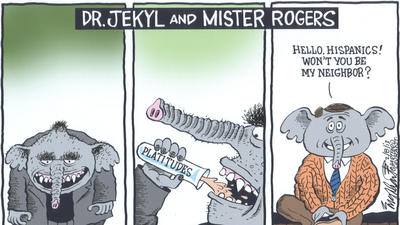

- Michael Gerson
- Opinion Writer
The Republican Party’s shortcomings
Recent brutal attacks on the GOP have claimed that minorities often think that “Republicans do not like them or want them in the country.” That younger voters are “rolling their eyes at what the party represents.” That former Republicans view the party as “scary,” “narrow-minded,” “out of touch” and populated by “stuffy old men.”
But these were not Democratic attacks. The quotes come from the Republican National Committee’s “Growth & Opportunity Project” report, which, as far as I can tell, is unique in the history of party-sponsored self-reflection. Losing parties generally look in the mirror and see the need for cosmetics. This report calls for reconstructive surgery. In the aftermath of the 2012 election, it describes a party unpopular with the public, fading in must-win states and progressively marginalized at the national level.
Michael Gerson
Gerson writes about politics, religion, foreign policy and global health and development in a twice-a-week column and on the PostPartisan blog.
Yet this analysis should be encouraging for Republicans in the same way that a reliable medical diagnosis is encouraging — it provides the basis for aggressive treatment.
The report, inevitably, set off an internal GOP conflict. This is not so much a matter of ideology; a number of politicians with tea party roots, such as Sen. Marco Rubio of Florida, have fully internalized these political realities. The emerging argument is between political realists and ideological entrepreneurs.
All conservatives believe in the power of markets, which is explanatory in this case. The RNC is attempting to reach the market of gettable voters in Ohio, Colorado, New Mexico and other electorally strategic places. Other conservatives target the markets of talk-radio listeners or attendees of the Conservative Political Action Conference. The RNC report engages this divergence of purposes in a forthright manner: “We have become expert in how to provide ideological reinforcement to like-minded people, but devastatingly we have lost the ability to be persuasive with, or welcoming to, those who do not agree with us on every issue.” The role of a political party, the report insists, is different from the pursuit of “universal purity.”
This declaration of independence is accompanied by a serious reassertion of the role of the party itself. The document calls for more purposeful outreach to minorities, improved campaign mechanics and a more rationally designed presidential primary process. It criticizes the proliferation of primary debates, as well as redundant or unhelpful campaign expenditures by lone-wolf advocacy groups.
But the report recognizes that Republicans require more than changed tone or technique; they need relevant, appealing policies. Here, the GOP is making some preliminary progress. The two early rivals for presidential buzz, Rubio and Sen. Rand Paul of Kentucky, both support variants of comprehensive immigration reform. Republicans who oppose gay marriage, such as Rubio, and those who support it, such as Sen. Rob Portman of Ohio, are now agreed on marriage federalism — respecting the rights of states to make their own choices.
Still, these efforts merely clear the decks of some existing objections, not dramatically expand Republican appeal. The 2012 election revealed insufficient GOP enthusiasm among working-class Americans and plummeting support among rising demographic groups, particularly Asians and Latinos. Appealing to these voters will require more than repetition of the Republican economic message circa 1980. They want the reassurance of a modern, functioning safety net and the realistic hope of economic and social mobility. Republicans have yet to effectively address either priority. (Alan: The Republican Party does not support a functioning safety net nor is it capable of advocating economic and social mobility until it stops funneling all available resource to the top of the pyramid. http://paxonbothhouses.blogspot.com/2013/03/reagan-budget-director-top-5-have.html)
This is partly an institutional problem. A smattering of conservative policy experts is working on these issues — conservative alternatives on health and education reform or promoting social capital and family stability. But the major conservative think tanks tend to be driven by ideological and donor priorities. Few conservative institutions operate effectively at the confluence of policy and politics.
Democratic reformers in the 1980s and ’90s had the Democratic Leadership Council to help reshape their identity and lay the policy foundations for Bill Clinton’s presidential run. Britain’s Conservative Party has the Centre for Social Justice, which in the past year has produced policy documents on fighting modern slavery, addressing child poverty, breaking the cycle of domestic abuse and strengthening marriage. Where is the Republican equivalent?
Major Republican donors seem perfectly willing to support the presidential races of quixotic candidates. They foot the bill for television attack ads. They seem less interested in funding the revival of ideas and policy that is a prerequisite to reestablishing a GOP majority. It is a strategic failure of the first order.
Those concerned about the Republican future hope for the arrival of a transformational candidate. But he or she will need something compelling to say.
592
Comments
Comments
